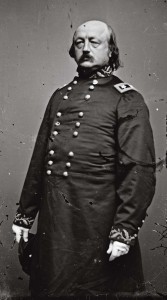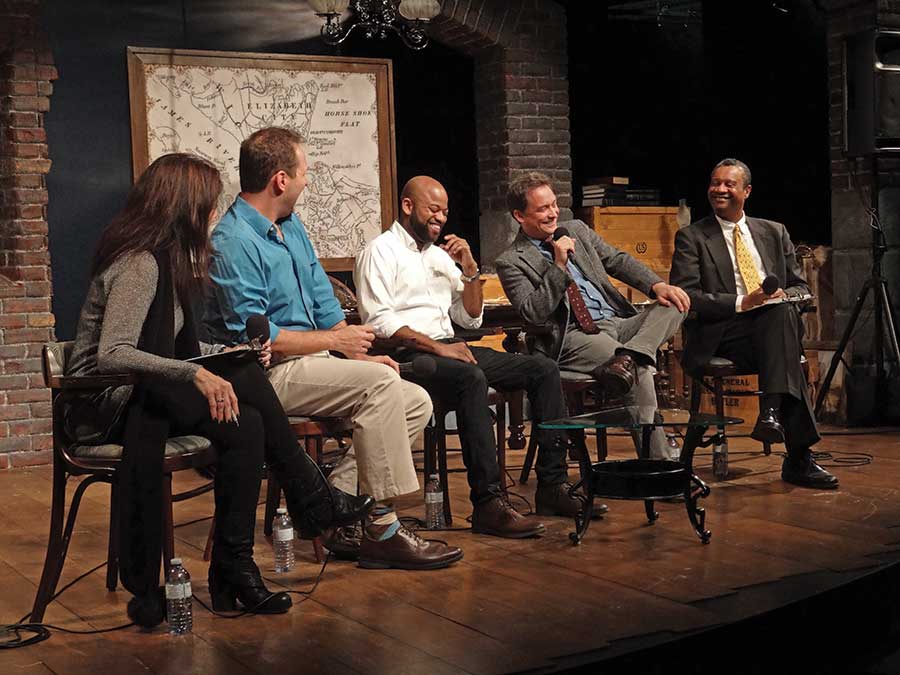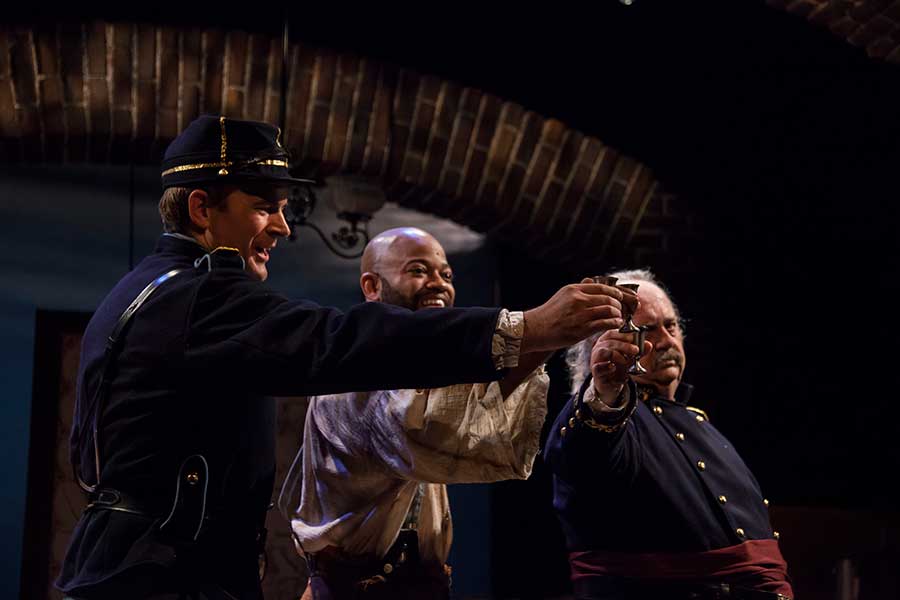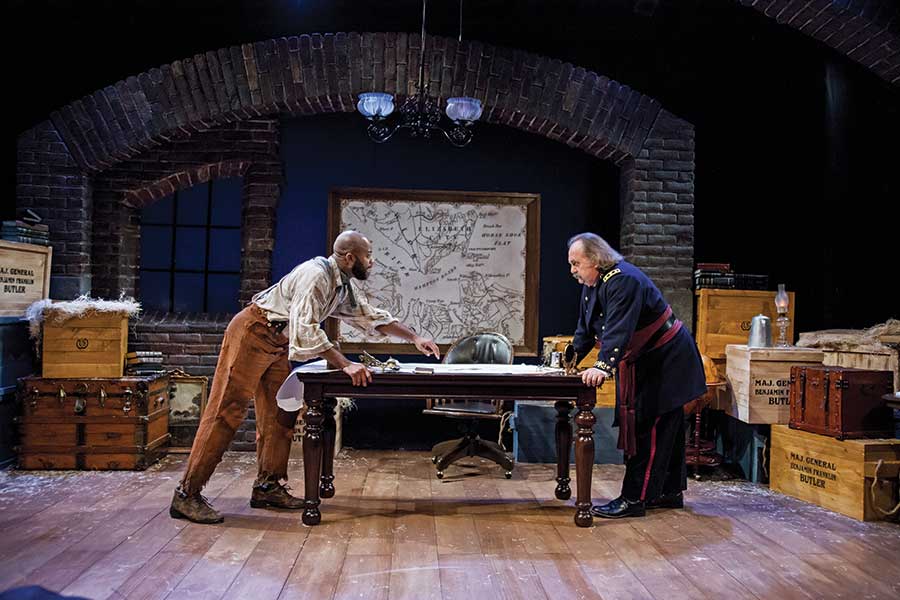The Civil War is an unlikely setting for a comedy. After all, how do you mine humor from one of our nation’s bloodiest periods? Can a play about America’s shameful legacy of slavery manage to shine light on a neglected corner of that story—and also get laughs? Producers and artistic associates at Florida Studio Theatre in Sarasota took a gamble when they programmed Richard Strand’s Butler for their mainstage season—and to run through its holiday slot, no less. You might even say that FST doubled down, choosing Butler as the production that would anchor their annual community forums. It was a risk, certainly. But, not unlike the long-shot move made by the title character of Strand’s play, FST’s bet paid off; the show, which opened Dec. 9, was extended through March 5.
Butler—a talky, four-character history play about a crucial moment in the American Civil War—tells the story of Major General Benjamin Butler, later elected to the U.S. Congress, who, in his early days at Fort Monroe in Virginia on the James River, changed the course of the war. When three enslaved men arrived at the base and asked that they be allowed to stay, Butler sensed an opportunity, arguing that enslaved persons were being used as weapons of war and could therefore be impounded as “contraband,” like ammunition or cannons; as such, they could be “confiscated,” which in effect meant they were allowed to remain at the fort and work for the Union army rather than return to their Confederate owners. This action was in direct violation of the Fugitive Slave Act of 1850, and Butler was understandably nervous about this flagrant lawbreaking, but as the tide of the war changed, President Lincoln himself eventually approved of Butler’s actions. Union military leaders across the country would come to adopt his policies as their own.
Strand’s play depicts a battle of wits between Butler and Shepard Mallory, a slave who escaped the Confederate army. It’s up for debate whether the real-life Mallory actually had such conversations with the general, but Strand has said that he wrote the play as a kind of proposal for what might have happened at Fort Monroe in 1861.
In Strand’s telling, it is Mallory who helps convince Butler to make his game-changing move. As they drink the general’s sherry and spar cleverly about why people fight and about violence against enslaved bodies, Mallory makes it clear that he has no intention of going back to the Confederacy, while Butler insists that he must. Soon, however, Butler realizes that Mallory’s insights into the plans and fortifications of the enemy make him a valuable asset for the Union side. More importantly, the general’s personal affection for the man eventually changes his mind. While much of the show’s conflict hinges on the notion that one of the lead characters is a piece of property—“contraband” slaves were essentially used as bargaining chips, and weren’t considered legally free until later in the war—the play shows how two men in a room can break each other’s defenses down, make each other (and the audience) laugh, and develop a respect for one another as intellectual and moral equals, no matter their official status. The play had its world premiere in 2014 at New Jersey Repertory Company.

Rehearsals for Butler began in early December with a cast of mostly New York–based actors: Joe Ditmyer, who played Butler’s subordinate Lieutenant Kelly; Shane Taylor, who played Mallory; Eric Hoffmann, in the title role; and FST associate managing director Jim Sorensen, as an arrogant major from the Confederate army. None of the actors, including the ones from New York, were strangers to FST. Director Jason Cannon said that FST has an unspoken rule to give precedence to “returning FST guest artists. This goes to understanding how we do things. It isn’t just a show.”
All involved agreed that the show’s early rehearsals were easygoing; they moved quickly from table work to blocking to full staging. For his part, Ditmyer referred to this period of rehearsal as “blissful.” Actors arrived to work with research in hand, sharing quotes from Gen. Butler and exploring the complex aspects of the character and his legacy.

For Hoffmann, Butler “was a man with feet of clay. And I look like the guy, which is unfortunate for me.” (The actor’s resemblance to the general really is uncanny.) Still, Butler is a sufficiently fascinating character that as soon as he heard about the part, Hoffmann felt he had to “find an opportunity to take on this guy.”
The tone of Strand’s play proved the first big hurdle. In early rehearsals, Cannon seemed more confident in the text than the actors did, with Taylor, for one, confessing that he found himself “a bit baffled.” He was concerned that the play “might make fun of slavery,” adding, “It’s challenging to define under what genre the play falls. It really is many different things: comedy, historical drama, farce, romance—at least in my character’s mind.”
The other performers concurred. “There are moments between Shepard Mallory and Lt. Kelly in scene five that are ridiculously funny,” said Ditmyer. “The challenge is being true to our characters and where they are in their journeys while experiencing these hilarious moments together.”
One key running gag gives an inkling of how Strand’s play teases out the comic ironies of a deadly serious subject. At the first meeting between Butler and the enslaved man, the general—a self-styled abolitionist and egalitarian—insists that Mallory call him by his first name, Ben, instead of using “Sir” or “General.” But it turns out that feeling of superiority and the desire for respect aren’t so easily discarded. From the earliest rehearsals, Hoffmann drew chortles from the director, the stage managers, and offstage cast members with a simple look of surprise or indignation every time Mallory called him “Ben.”
Comic bits aside, Hoffmann called it “an important historical story about racism and prejudice, and one small step in the right direction.”

It was the play’s commitment to telling a story about equality and the politics of race in America that FST decided to emphasize in its marketing for Butler. As Cannon put it, “Even though this play is set at the beginning of the Civil War, it’s not a play about history but a play about today. The volatile conversation about race and immigration, the reenergized furor over the Confederate flag, the resonance of Black Lives Matter—our society is grappling with a fundamental shift.”
The FST team included Butler as a part of a long-term series of forums they’re conducting in association with city leaders in Sarasota and the surrounding community. FST is calling this season’s forums “Dialogues on Diversity,” and they’re designed to foster communication between community organizations and nonprofits by giving them a place to meet, and by introducing community leaders to one another. These dialogues are spearheaded by those leaders rather than theatre people; although the plays are produced by FST, the dialogues about those plays are being run by people with expertise in real-world issues such as homelessness, healthcare, income inequality, and accessibility services.
Approximately a week before opening night of Butler, FST hosted a kickoff reception, attended by community leaders and service organizations. FST associate director Kate Alexander established the tone for the event by saying that “for the theatre to be viable, our walls need to be porous.” Alexander and the assembled community leaders—representatives from the region’s libraries, the local NAACP chapter, law enforcement, museums, health organizations, and Sarasota mayor Willie Shaw—each spoke briefly about what the dialogues were intended to do for the community.
The overwhelming whiteness of the regular theatre audience in Sarasota was an issue on everybody’s lips. As one of the actors said early in the rehearsal period, “It’s a pretty homogeneous audience; people in Sarasota have a certain amount of money—rich white people. Butler speaks directly to them. The challenge is bringing in audiences of color. But this is one of the most involved cities I’ve ever seen.”
The group at the kickoff event for Dialogues on Diversity was anything but homogeneous. Community leaders noted that this was due to the work that Florida Studio Theatre has been doing over the last 30 years in the community. Said Dr. Ed James II, a weekend news anchor and pillar of the Sarasota community, “When I came to see Race at FST [in Spring 2011], the audience didn’t look like this.” Back then, James took his complaint directly to Alexander. “I told her: ‘The next time I come, I want the audience to look like all of Sarasota.’ And she did good. She made it happen.”
When asked why Butler was included in the season, FST artistic director Richard Hopkins said that “more plays are being written on the issue of race than at any other time,” and that’s as it should be: “We need more plays about race.” And in fact, “The next level of work that needs to be done is on the white people.” On the other hand, this isn’t to say that FST believes its job is to teach. “I’m not crazy about ‘issue’ plays,” said Hopkins. “Theatre artists shouldn’t think they know. It is our job to engage the audience with fierce dialogues.”
For managing director Rebecca Hopkins, the real key to FST’s community engagement is its subscription audiences. “Our subscription audiences have a relationship with us,” she said. “They’ve been seeing these plays. We know they’re going to engage, and we’re learning from them, too.”
FST marketing director Audra Lange stressed this as well: “While the talk among media is that subscriptions are ‘dead,’ FST is a great example that they are not. Our subscriptions allow us to fill our houses to 80 percent capacity before the season begins.”
“The subscriber base is core to who we are,” added Richard Hopkins. “We built it because we wanted to have a dialogue with our community.”
Still, said Alexander, this didn’t happen overnight. “It took a long time for us to build it—this trust had to be built with the community over time.” And according to a number of FST staffers, because the subscriber base is such a loyal and dependable audience, every show done at the theatre is part of a larger community conversation. No show operates in isolation.
And no theatre experience at FST does either: Its main building is equipped with a bar and restaurant, relaxed spaces that can facilitate conversation and fun. The opening night of Butler, for example, was certainly an occasion, but more than anything else, it felt like another point of connection in an ongoing, longstanding exchange with Sarasota.

By the time opening night arrived, the actors were feeling much more comfortable with the play—and much more confident with Butler’s blend of levity and import. The cast credited their confidence in the play’s comedy to their director. Sorensen praised Cannon’s “strong grasp of the subtleties of the setup and the landing of a joke, be it verbal or physical.” Taylor was perhaps the most surprised by the value of the play’s comedy: “What a joy it has been to discover the funny in Butler!” he enthused. “It took a moment for me, as a black actor portraying a fugitive slave, for the comedy to reveal itself to me. I was hell-bent on making sure the story was told truthfully, honestly. I now realize that in order for the dramatic moments to resonate in the world that Mr. Strand has created, the comedy must land, which allows both audience and actors to exhale.”
Truth be told, Taylor’s initial fears were shared by the rest of the company and artistic staff. “It has so much good humor in it,” said Richard Hopkins. “Will people think we’re making light of the subject?” If the team seemed worried about anything as opening night approached it was this: Will audiences think less of Butler because it’s funny?
In Richard Strand’s view, the comedy in Butler is linked precisely to the play’s content. The very absurdity of slavery as a defensible ethical position, he said, is what creates opportunities for comedy. But it’s not like he followed a master plan, he admitted.
“It is hard for me, in retrospect, to be sure of what I had in mind when I wrote the play,” said Strand, who has seen four productions of his play to date, including FST’s. “I was aware that both Butler and Cary (the Confederate officer) accept the absurd premise that one man can own another man. I knew that their acceptance of that premise would force them to defend things that were indefensible and, therefore, that portions of the play could become humorous.”
But it was Strand’s hope that the jokes wouldn’t obscure Butler’s exploration of history. “I always had a serious intent in writing the play, and that intent was always the most important thing to me. Frankly, I have been surprised by just how much audiences respond to the humor. It is very gratifying to hear an audience laugh—it means they are engaged. But if I thought the laughter was crowding out my serious intent, I would have to do something about that.”
A perfect example of the way the play blends comedy and critique comes in the play’s second scene. When he sees that Colonel Mallory, the head of the Confederate fort just south of Butler’s own, has the same last name as the fugitive Shepard Mallory, the general asks if the two men are related. The line is a joke, and it gets a laugh. But Butler’s question also reminds the audience of the sexual violence committed against black women in the period by the men who enslaved them. In fact, while the line is funny, the idea is not at all laughable. So are the two men related? “Not as far as I know,” Mallory replies dubiously. “But I’m a little hazy on just who my relatives are.” Time and again throughout Butler, Strand reminds the audience of the dehumanizing effects of slavery and of the violence it enacted on living bodies. The audience may be allowed to laugh, but is also asked to think.
By opening night, Taylor said, “It has never been more clear to me that the other side of drama is comedy.” And Ditmyer remarked that “the comedy in Butler is necessary and wonderful, and opens the heart of the piece even further.”

Critics in Sarasota mostly agreed; audiences left laughing and talking. In The Observer, Marty Fugate called Butler “strikingly original, defiantly smart, and very, very funny,” and Jay Handelman of the Sarasota Herald-Tribune began his review with the rhetorical question, “Who knew history could be so much fun?”
The Bradenton Herald’s Marty Clear confessed that he took some time to warm to Butler, describing the play’s opening sequence as “almost painfully slow.” The first scene, he complained, “offers only a few scattered chuckles and a tiny bit of exposition, but it goes on and on. And on.” But even he was won over eventually; he reported that he “left thinking about how much fun the play was, and marvelling at playwright Strand’s inventiveness,” as well as the play’s excellent performances.
For director Cannon, the play’s ability to connect with audiences was not a surprise. “One’s art is intimately connected to one’s context,” he said, “and having been at FST for three years now, I have a grasp of the taste, expectations, and tendencies of our audience. Butler is the kind of theatre our audience comes directly to us to experience: character- and dialogue-driven, intellectually demanding, utilizing humor to approach serious intent, and focused utterly on the real-time relationship that exists between the actor and the audience.”
No one seemed to miss the gravity of the play’s subject matter, either. As Kay Kipling noted in Sarasota Magazine, “All the clever wordplay and comic escalations don’t mask the serious nature of what’s at stake here. Today’s battles between North and South may be more a matter of beliefs and backgrounds than geographic boundaries, but the questions that Strand raises about civil rights, equality, and other topics still resound today.” The Observer’s Fugate recognized that “the Civil War might as well have happened yesterday. The battles continue.” Butler, said Fugate, “finds high comedy in those battles. But it never lets you forget the ideas behind the fighting.”
Indeed, the team at FST is not done engaging its audience on the topic of racism in America. The season closer will be the regional premiere of Kenneth Jones’s play Alabama Story, based on the true story of the controversy surrounding Garth Williams’s 1958 children’s book The Rabbits’ Wedding, which depicted a marriage between a white rabbit and a black rabbit. At that time, the White Citizens’ Council and other supporters of Jim Crow policies asked for the removal of the book from state libraries, seeing it as a metaphor for interracial romances.
“‘Safe’ never comes into the equation,” said Rebecca Hopkins when talking about the theatre’s offerings this season. “We don’t do a lot of safe.” Alexander agreed: If the theatre isn’t contributing to the national conversation, it isn’t doing what it ought to be doing. “Dialogue is the most important,” she said.
Judge Charles E. Williams, longtime FST supporter and the head of the steering committee for the Dialogues on Diversity, maintains that “whatever community you live in, you have an obligation to make that community better.” And one of the things that the theatre can do for a community is “establishing a place for people to do that.”
Aaron C. Thomas is assistant professor of theatre history and literature in the School of Performing Arts at the University of Central Florida. His most recent article, “Watching A Raisin in the Sun and Seeing Red,” was published in Modern Drama last December.


